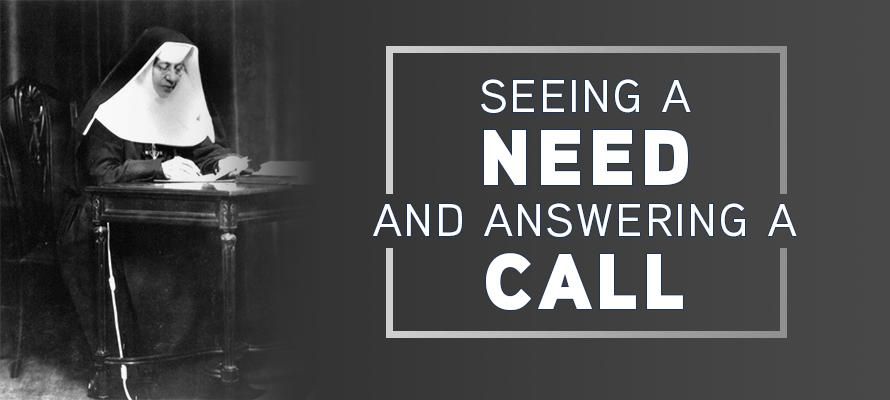
As we are today, it seems that humanity has always existed through struggles. Wars, famine, civil unrest, natural disasters, and epidemics seem to have always been a part of daily living. Many in the wake are left in destitute situations and have become solely dependent upon others for help. I love reading about our Catholic saints (my superheroes) and often am left wondering how they all became so selfless and holy. What did they read, what did they see, and what did they experience during their lifetime to become such incredible warriors for God? More importantly, how did they learn to love and fully trust in God’s will? As we leave the month of February behind, the month where our Lenten journeys began, we embrace March and remember one of our very own great American saints, St. Katharine Drexel. A young woman who saw a need and decided to surrender her privileged life and family’s fortune, and act within a ministry of service.
St. Katharine Drexel
- Born: November 26, 1858 in Philadelphia, PA
- Died: March 3, 1955 at the age of 96
- Beatified: November 20, 1988 by St. Pope John Paul II
- Canonized: October 1, 2000 by St. Pope John Paul II
- Major Shrine: Cathedral Basilica of Saints Peter and Paul, Philadelphia, PA
- Patronage: Philanthropy and racial justice
St. Katharine Drexel was born into a very wealthy family. Her father Francis Drexel was a successful investment banker in America (J.P. Morgan) and across Europe. Her mother, Hannah Drexel, sadly died just five weeks after Katharine was born and she and her older sister Elizabeth were cared for by their aunt and uncle, Ellen and Anthony Drexel (namesake of Drexel University) for a short time. Francis remarried to Emma Bouvier and a few years later and they welcomed a third daughter named Louisa.
Devout Catholics, both Francis and Emma were active in charitable works within their communities and distributed food, clothing, money, and medicine out of their home three days a week. The Drexels’ spent about $30,000 annually on this home-based charity, and many of the items donated were made by the Magdalen Sisters at the Convent of the Good Shepherd. This partnership sustained both the women who made the textiles and those who received the donations. Their stepmother’s generous works combined with their father’s dedicated prayer life left a lasting impression on all three daughters throughout their formative years. Their faith combined with a zeal for serving others had overshadowed this family’s great wealth, and a young St. Katharine began hearing God’s call to service.
Because of their parents’ desires to bring aid to the poor and oppressed, the Drexel girls had first-hand experience visiting impoverished areas of our country. It was during a trip out West while visiting an Indian reservation that St. Katharine became aware of how the Indians struggled to survive without even the basic necessities. Education and religion had already become so important to the Drexel family and seeing the distressed living conditions on the reservations and how Black Americans were struggling in the south, helped make the founding of schools and churches this family’s undertaking.
“If we wish to serve God and love our neighbor well, we must manifest our joy in the service we render to Him and them. Let us open wide our hearts. It is joy which invites us. Press forward and fear nothing.”
It was after St. Katharine had nursed her ailing stepmother for 3 years during her bout with terminal cancer and also after losing her father suddenly in death a few years later, that she came to an astonishing conclusion. No amount of money in the world could save you from pain or suffering. In her grieving state, she became filled with and immense love of God and neighbor. Left with their parents’ fortune, together the three Drexel sisters sought out different ways to continue their parents' legacy. In one such endeavor, they found themselves in private audience with Pope Leo XIII. St. Katharine had asked the Pope to send teachers and evangelists to the Indian reservations back home, when instead he quickly suggested that she do it herself. Taken aback by the Pope’s instruction, St. Katharine gradually became attuned with her task at hand. This would be her way of extending God’s compassion and mercy to those in need.
“If we are disciples of Jesus, we shall be happy to spend ourselves & be spent for the salvation of souls.”
Shortly after her conversation with Pope Leo VIII, St. Katharine entered religious life as a novice under the training of the Sisters of Mercy in Pittsburgh, PA. She took her final vows in 1891, and in time with the help of other nuns, founded the Sisters of the Blessed Sacrament for Indians and African Americans. Her main goal in life was to provide education for those who wished to take advantage of it. But it was the love she found in the Eucharist that drove her to serve and provide for the needy. The Drexel estate funded and built a vast assortment of boarding schools, orphanages, churches, Catholic schools and eventually universities all over the country, and by the time she had died, St. Katharine’s order had more than 500 members, opened 145 missions, 49 elementary schools and 12 high schools. Today, her order continues its missionary and educational work.
Not many of us are born to such wealth as the Drexels, but we are all born with time and gifts to share if we are willing to give them. We need to look at all the moving parts of the Drexels’ grand philanthropic vision and try to see ourselves within its works. This can be applied to the works of every saint. We can volunteer to serve others in our inner city, we can stand on the lawn of Planned Parenthood with our rosaries and pray, we can help lead Life Teen groups at our parishes, we can coach a CYO sport, and we can be greeters at the doors of churches. Seeing a need is a call. St. Katharine teaches us that a strong prayer life and partaking fully in the sacraments helps us to hear God in the gospels. We all have gifts to share, and our priests and sisters need our help in sharing Christ and His life, not only to our Catholic brothers and sisters, but also to our neighbors. What will you do to become God’s voice, hands, eyes, and ears?
“Peacefully do at each moment what at each moment needs to be done.”




